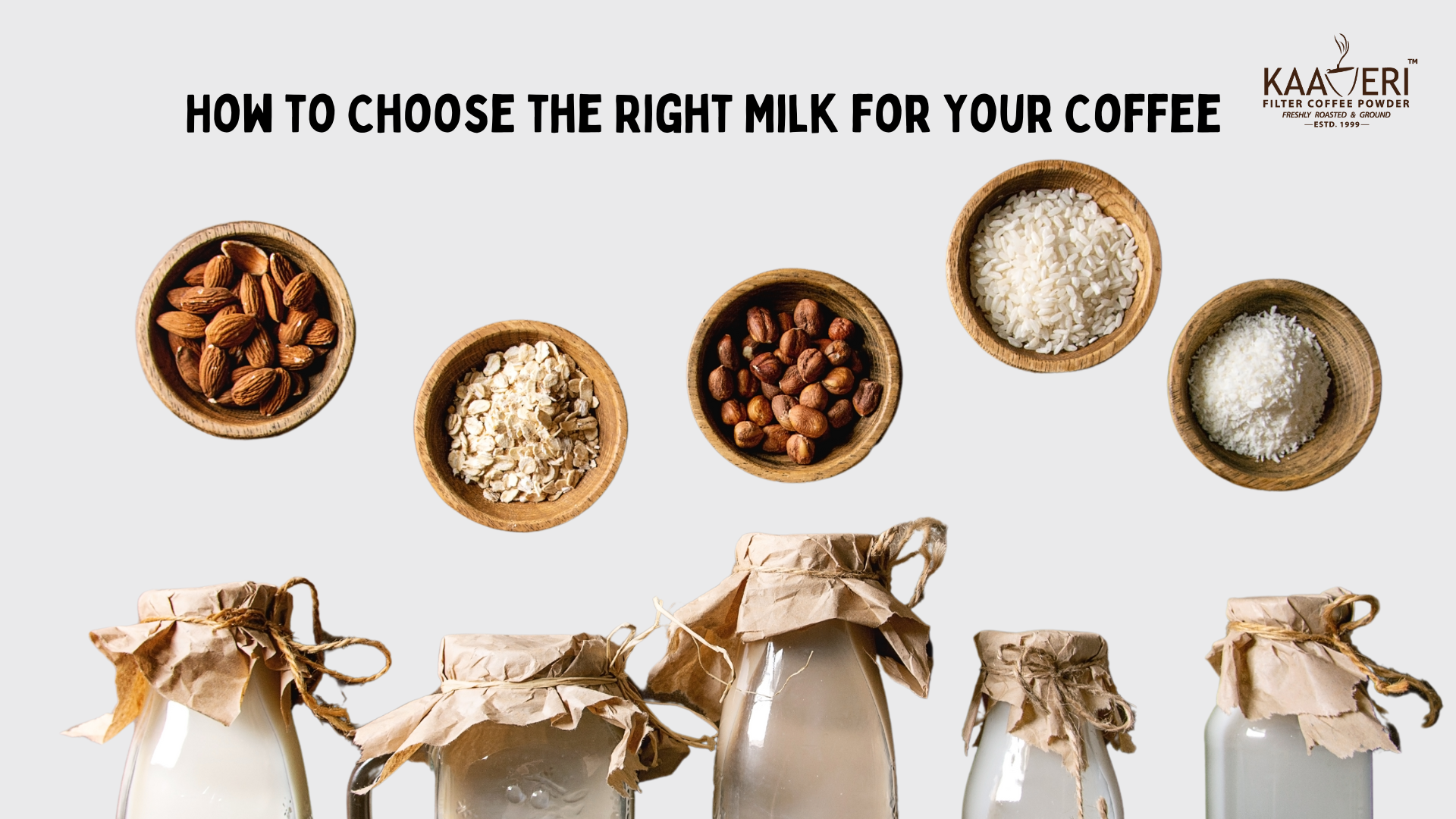
How to Choose the Right Milk for Your Coffee
Table of Contents:
| Sl. No | |
| 1 | Introduction |
| ‣ Importance of Choosing the Right Milk for Coffee | |
| 2 | Understanding Dairy Milk Options |
| 3 | Exploring Plant-Based Milk Alternatives |
| 4 | Matching Milk with Coffee Type |
| 5 | Nutritional Considerations When Choosing Milk |
| 6 | Conclusion |
| Final Thoughts on Choosing the Right Milk for Your Coffee | |
| 7 | Frequently Asked Questions |
Introduction
How to Choose the Right Milk for Your Coffee
When crafting the perfect cup of coffee, the choice of milk can greatly influence the taste, texture, and overall experience. Whether you’re a latte lover or a fan of frothy cappuccinos, selecting the right milk is key. With so many milk options available, it can be challenging to know which one will best complement your brew. Let’s explore the different types of milk and how they can enhance your coffee-drinking experience.

Understanding Dairy Milk Options
Dairy milk has long been the go-to choice for coffee enthusiasts. Whole milk, with its creamy texture and rich flavour, is ideal for those who enjoy full-bodied coffee drinks like lattes and flat whites. For a lighter alternative, skim milk or 2% milk provides a similar frothy texture without the extra calories. However, whole milk tends to produce a richer foam, making it the best choice for cappuccinos. The fat content in dairy milk also helps to balance the acidity of espresso, making for a smoother cup.

Exploring Plant-Based Milk Alternatives
In recent years, plant-based milk options have grown in popularity. For those who are lactose intolerant or prefer vegan options, almond milk, soy milk, oat milk, and coconut milk offer fantastic alternatives. Oat milk is particularly popular due to its creamy consistency, which closely mimics that of dairy milk, making it ideal for frothy coffee drinks. Soy milk offers a slightly nutty flavour, while almond milk is light and perfect for those who prefer a less creamy texture. Coconut milk, on the other hand, adds a tropical twist with its mild sweetness.

Matching Milk with Coffee Type
Different types of coffee pair better with specific milk types. For example, espresso-based drinks like macchiatos and cortados often go well with full-fat milk or oat milk, as these add a luxurious creaminess. Lighter milk options like almond or skim milk are better suited for drip coffee or cold brew, as they don’t overpower the delicate coffee flavours. For iced coffee, plant-based milks are a popular choice, as they blend easily and add a refreshing touch without making the drink too heavy.
Nutritional Considerations When Choosing Milk
While taste and texture are essential, health-conscious individuals may want to consider the nutritional benefits of each milk type. Dairy milk is a great source of protein and calcium, but it can also be high in calories, especially whole milk. Almond milk and coconut milk are lower in calories but also lower in protein. Oat milk, however, strikes a good balance with its fibre content and moderate calorie count, making it a well-rounded choice for those seeking a healthier option.

Conclusion:
Choosing the right milk for your coffee can make all the difference in your daily brew. Whether you prefer the creamy richness of whole milk, the light texture of almond milk, or the balanced smoothness of oat milk, there’s an option for everyone. Your choice ultimately depends on your personal taste, dietary needs, and the type of coffee you enjoy most. By understanding the characteristics of each milk, you can elevate your coffee experience, ensuring every sip is as satisfying as the last. So, experiment with different milk types and find the perfect match to complement your favorite cup of coffee.
Frequently Asked Questions (FAQs)
Q: What milk froths are the best for coffee?
Whole milk and oat milk froth are the best due to their higher fat content, which creates a thick, creamy foam perfect for lattes and cappuccinos.
Q: Can I use almond milk in hot coffee?
Yes, almond milk can be used in hot coffee. However, it can sometimes curdle when exposed to high temperatures, so it’s best to warm the milk before adding it to hot coffee.
Q: Is plant-based milk healthier than dairy milk?
It depends on your dietary needs. Plant-based milk like almond and oat milk are lower in calories, but dairy milk provides more protein and calcium.
Q: Which milk adds the least flavour to coffee?
Skim milk and almond milk tend to add the least amount of flavour, making them great options for those who want the coffee’s natural taste to shine.


No Comments